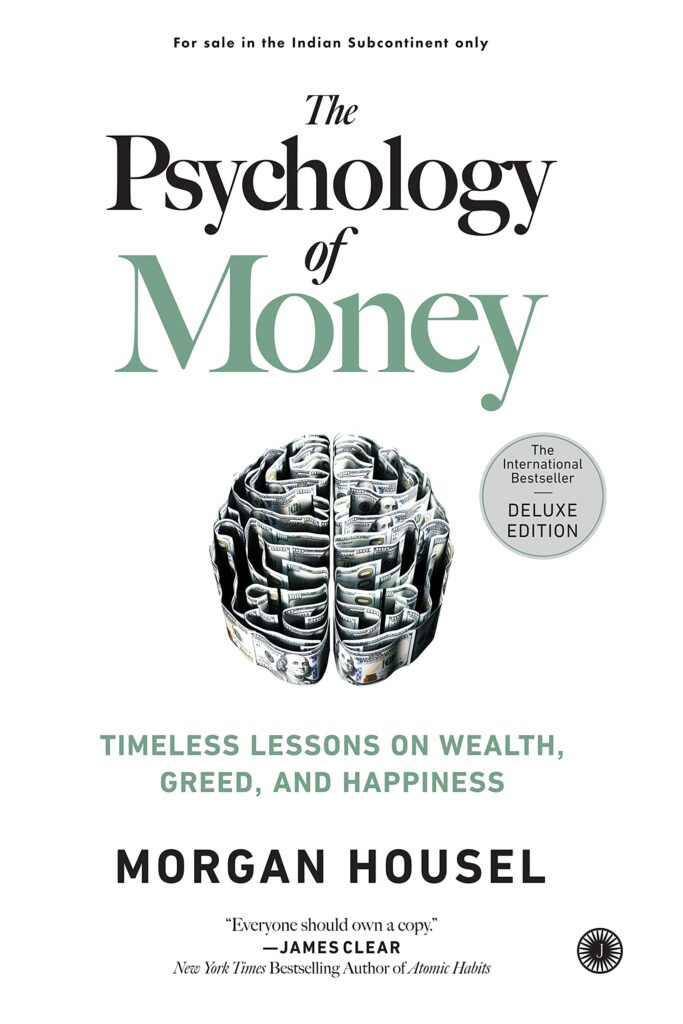
The Psychology of Money: Key Lessons from Morgan Housel
Money is more than numbers—it’s emotions, behavior, and decisions. In his bestselling book, The Psychology of Money, Morgan Housel explores how people think about money and wealth, and why financial success is more about behavior than knowledge. Unlike traditional finance books, Housel uses stories, real-life examples, and insights to teach readers how to manage money wisely.
This article summarizes the key lessons from the book, helping you understand how to think about money and make smarter financial choices.

1. Luck and Risk Shape Financial Outcomes
One of Housel’s most important points is that financial success is influenced heavily by luck and risk. Often, people assume wealth is only about intelligence or hard work, but chance events and circumstances play a huge role.
Example
Bill Gates had access to a computer at the right time in high school, which gave him a unique advantage. While skill and effort mattered, timing and opportunity were also crucial.
Lesson
Recognize that luck and risk exist. Stay humble when you succeed and resilient when setbacks occur. Avoid judging others solely by their financial outcomes—they may have faced different risks and luck.
2. Wealth is What You Don’t See
Many people equate wealth with luxury—expensive cars, lavish houses, or designer goods. Housel argues that true wealth is hidden: it’s the money you save, invest, and accumulate quietly.
Example
A neighbor may drive a luxury car but have little savings. Conversely, someone living modestly and consistently investing is quietly building significant wealth.
Lesson
Focus on saving and investing, not appearances. True wealth provides freedom and security, not just status.
3. Never Enough: Avoiding Comparison
Comparison is a dangerous trap. People often feel they need more money, not realizing that chasing others’ lifestyles can lead to unnecessary risk and stress.
Example
Two investors earn vastly different incomes. The one who spends less than they earn and saves consistently will often end up wealthier than the one who keeps up with peers.
Lesson
Set your own financial goals. Define what “enough” means for you instead of comparing yourself to others.

4. The Power of Compounding
Compounding is one of the most powerful forces in wealth creation. Small, consistent investments grow exponentially over time.
Example
Warren Buffett started investing as a teenager. Most of his wealth accumulated after age 50, thanks to decades of compounding.
Lesson
Start investing early, be consistent, and allow time to work in your favor. Compounding rewards patience, not impatience.
5. Save More Than You Earn
Housel emphasizes that saving money is often more important than earning more. Your income is only part of the equation; your savings rate determines your financial freedom.
Example
Someone earning ₹50 lakh a year but spending ₹49 lakh has less freedom than someone earning ₹10 lakh and saving ₹5 lakh consistently.
Lesson
Prioritize saving over flashy spending. Financial independence is built from what you keep, not what you earn.
6. Reasonable Beats Rational
Financial decisions shouldn’t just be mathematically perfect—they need to be reasonable for your life and temperament. Trying to maximize returns without considering personal risk tolerance often leads to mistakes.
Example
Investors panic during market downturns and sell at a loss. A reasonable strategy—investing consistently within your comfort level—often yields better long-term results than chasing the highest returns.
Lesson
Invest in a way that aligns with your goals, emotions, and lifestyle. Reasonable, consistent behavior trumps perfect calculations.
7. Control and Freedom Are True Wealth
Housel defines true wealth not by numbers but by control over your time and choices. Money should give freedom—the ability to pursue passions, spend time with family, and avoid unwanted stress.
Example
An entrepreneur who reinvests profits wisely may not earn the most immediately but gains autonomy over their life, which is more valuable than any salary.
Lesson
Use money as a tool to increase freedom, not just as a measure of status. Financial security is about choice and independence.
8. Patience is More Important Than Timing
The book highlights that time in the market beats timing the market. Many investors try to predict the perfect moment to buy or sell, often with poor results. Long-term patience and consistency lead to better wealth accumulation.
Example
Ordinary salaried individuals who started small SIPs (Systematic Investment Plans) in the 1990s now have crores in their portfolio thanks to decades of patience.
Lesson
Focus on long-term consistency. Avoid emotional reactions to short-term market fluctuations.
9. Prepare for the Unexpected
Financial planning isn’t just about growth; it’s about managing risk and uncertainty. Life is unpredictable—job loss, illness, or market downturns can happen anytime.
Example
Even successful investors keep emergency funds and diversify portfolios to handle unexpected events.
Lesson
Build a financial buffer, diversify investments, and plan for contingencies. Wealth is not just accumulation but security and resilience.
10. Money is Emotional
Finally, Housel emphasizes that money is deeply emotional. Our choices are shaped by fear, greed, envy, and hope. Understanding these emotions helps make smarter financial decisions.
Example
A person may sell investments during a market crash out of fear, missing out on recovery. Awareness of emotional biases can prevent costly mistakes.
Lesson
Acknowledge your emotional biases and make decisions that balance logic and temperament. Emotional intelligence is as important as financial knowledge.
Final Thoughts
The Psychology of Money teaches that wealth is more about behavior than numbers. The key takeaways:
- Accept the roles of luck and risk
- Focus on saving and investing, not appearances
- Start early, be patient, and let compounding work
- Prioritize freedom and control over status
- Make reasonable decisions that fit your life
By applying these lessons, anyone can build sustainable wealth, avoid common mistakes, and achieve financial freedom. Morgan Housel’s insights remind us that money isn’t just math—it’s psychology, behavior, and choices.
For the Latest Jobs Notifications: Click Here
Join With Us On WhatsApp: Click Here
Join With Us On LinkedIn: Click Here
Free Python Learning: Click Here